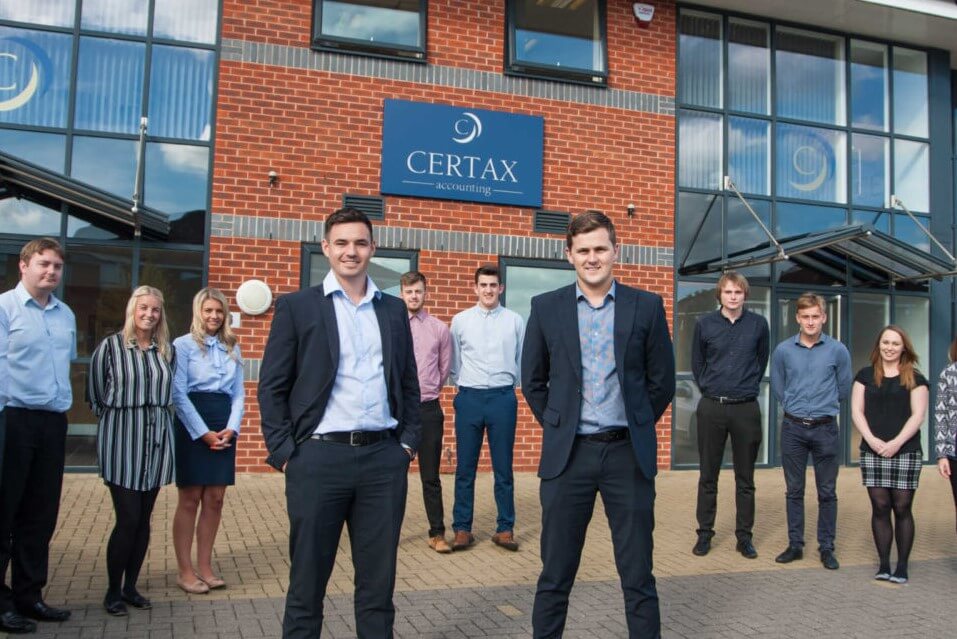Finding time to properly focus on clients and grow the business is an ongoing challenge for firms big and small. Never more so than over the last few months.
Matt McConnell – co-owner of Certax Accounting in Durham – should be struggling more than most. He and his partner, Jonathan Tait, are running a 32-strong practice, supporting over 1000 clients, studying for their Chartered Accountancy exams and have just processed 650 furlough claims, for free. Matt’s wife, a receptionist at his firm, is currently furloughed and looking after their young twins at home – arguably busier than Matt.
So how, under these circumstances, is Matt’s practice saving more than 150 hours a month? When Matt made this claim in our recent live panel discussion, we jumped on a Zoom call to find out.

James Byrne (left) and Matt McConnell.
Sixth Form drop-out to business owner at 22
Matt’s journey began with a love of maths at school, rapidly followed by a hatred of maths at sixth form. Dropping out of his A-levels, he got an apprenticeship at a small accountancy practice. “It was a fairly young, forward-thinking firm in the North East and I just really enjoyed it. I did my AAT level four with them, then at the start of my second year, I got the opportunity to start my own business.”
When the firm closed and sold their clientbase, Matt and Jonathan got their heads together, took over 100 clients and bought into the Certax franchise.
“In 2013, Jonathan and I were 22 and 23. Before we knew it, we had three hundred new clients then four, then five… Wow. We went from 300 to 550 in 18 months just organically”
By 2017, they had over 1000 clients on their books and a team of 20, thanks in part to creating their own training programme, giving local young people a foot in the door.
“I think we grew too fast, right? We learnt valuable lessons, which generally cost us money – bad or expensive software, things like that.”
The switch from IRIS to AccountancyManager
Three years ago, Matt and Jonathan’s focus turned to strengthening their firm’s foundations – in preparation for further growth. Namely: working on becoming chartered accountants and implementing the most effective systems for their team and clients.
“We were using IRIS and spending about £50,000 a year with them. This all-in-one package had everything, but it wasn’t doing everything the way we wanted it to do.”
In his hunt for software to best fit his business, Matt unearthed many “generalised CRM systems, or systems made for estate agents, which have been shoe-horned in the accountancy world”. Until he found AccountancyManager, that is. “Even in those early days of AccountancyManager, it did everything that we needed it to do.”
Matt’s advice: Tweak your software – not your processes
Having tried one-size-fits-all practice management systems, flexibility was crucial for Matt. “When you buy something ‘off the shelf’ it might work straight away, but you have to change your processes around it. The key is to customise your software around your existing workflows.”
“It took us about four months to completely migrate to the new system but once that was done, amazing. Just amazing. It’s the centre of our business now.”
Automatically building emails and texts
Of these customisations, ‘canned messages’ have become one of Matt’s particular favourites.
“We used to write out a full letter, taking 15 minutes. Then the printer would break or run out of ink. And you’d just be pulling your hair out. I wanted something much more streamlined.”
Canned messages are paragraphs you write once, that AccountancyManager uses to automatically build highly-relevant emails and texts for your clients. You don’t even have to ‘copy and paste’ these messages, as Matt explains:
“We have toggles in AccountancyManager, so say we’ve got a client on Xero, who uses Receipt Bank and we have their bank feeds, all three toggles would be ticked. That creates a certain type of message which would go to that type of client. If we’ve got a client who still brings us bags of paperwork, they will get different messages because all the toggles will be unticked.”
“The 150 hours is a minimum across the board actually. I think we’re saving a lot more time in real terms.”
Knowing whether clients have read emails
Matt also appreciates having a record of all emails and texts his practice sends out – and knowing for certain that clients have read them.
“So, for the month end on 31st of March, you’ll say: ‘This is how much to pay, please pay by the 7th.’ Then the client comes to us on the 15th or 16th of May saying ‘I’ve had this letter and the VAT return hasn’t been paid or submitted.’ Then you look on the system and the client’s read it five or six times.”
Usually, if a client has a problem or misses a payment they’ll come straight to Matt or Jonathan. With AccountancyManager, Matt can say in confidence that the team has done the right work. Having this system in place acts as protection for the team, giving an invaluable paper-free audit trail of where the responsibility and liability lies.
Avoiding fines and duplicate work
Matt recalls life before AccountancyManager, when hitting deadlines relied on an individual accountant’s time management.
“Four years ago our software didn’t link with Companies House. We’d end up missing confirmation statements and paying the penalties because it was a slip up from the software. That just doesn’t happen now.”
Matt welcomes the recent integration between AccountancyManager and Xero too. Especially while his administrative staff are on furlough. “What we used to do is use the fees in AccountancyManager to raise the invoice then an administrator would type up the information into Xero. That’s rectified now, which is amazing.”

Empowering staff. Freeing up the partners.
Matt attributes his own recent surge in productivity to a combination of having the office to himself – and his team having everything they need in AccountancyManager. He’s realised that many of his distractions came from questions from his staff. Being forced to lean more heavily on the information in AM, his team has naturally taken more initiative.
“I’m getting the team to a point where they are more self sufficient, they’re on top of the deadlines and I don’t really get involved that much in terms of compliance work.”
Matt admits that he is still a bottleneck for the business. “ Although we’re growing at a rate of knots, it will get to a point where I can’t I can’t take on any more clients. At the moment the team is supporting me. Eventually they will be client facing and I’ll simply be supporting the team.”
More visibility. Less micromanagement.
“Everyone from the admins up to the senior guns, I know exactly what they’re working on.”
By being able to see what his team is working on means Matt can answer client questions about job progress instantly. “It’s great, if a client says ‘where are my accounts?’ I can see if someone’s working on them and I can give them a more informed response.”
“Having a complete oversight of the whole business, there’s not so much micromanaging so you can just check in and out when you need to.”
Giving clients value for money – by logging time
“Back in the day, time-log systems were manual and you have to use six or 10 minute blocks”
When Matt first came across AM, he was impressed by the ease and accuracy of tracking time. “You have a task time button and you press start when you start the task. When you come out of it, it stops. So it’s logging time to the second.”
“What we quickly found was there were a lot of clients which weren’t getting much service for the money.”
While Matt and Jonathan’s salaries are built into the staff’s time, the rest of the team tracks all their time through tasks in AccountancyManager. For Matt, this has highlighted areas of improvement in their client service and transformed their pricing strategy: “I’ve seen other accountants don’t log time or they think it’s a waste of time. But the cost to us is how much time the team is spending.
“Transactional-based pricing doesn’t take into account if a client’s been on the phone for 30 minutes. So for me, it’s one of the best things about AccountancyManager.”
So, what does the future hold?
This year, Certax Durham have their sights set high. “I’m really looking forward to the next year to five years where we’re going to be chartered, which means we can bring in more talent, recruit more experience.”
Matt’s thankful that they’ve been able to keep all their staff on, albeit with a few on furlough. Now that he and Jonathan have refined their processes with Xero, AccountancyManager and Practice Ignition.
“It means when they come back (from furlough), there’ll be a lot more time to spend on servicing the clients. A lot more time. Everything’s going to be automated. We’re saving a lot of time and we’re essentially going to be generating better cash flow, better profits.”
Matt leaves us with a strongly worded suggestion. “If you create a similar thing to Practice Ignition or integrate with them. Then, I’m not going to say we’ll have the perfect practice, but we’ll have as close to the best set up that we can get.”
We’re working on it Matt, we’re working on it.

